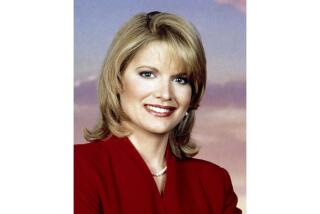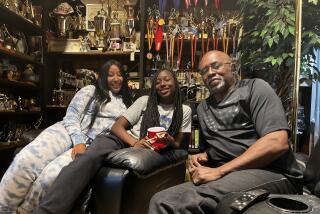Exile on Spain’s Feet : Sprinter Myers Trades Her U.S. Citizenship for the Chance to Regain International Glory
- Share via
BARCELONA, Spain — Sandra Myers knew the song; they used to play it for her in the early 1980s, back when she was a top-notch American hurdler, back when she was a record-holder.
She heard “The Star Spangled Banner” a lot in those days.
But as Myers stood on the victory platform in Seville last March and listened to the U.S. anthem played for another runner, something caught in her throat.
“Every now and then there’s a little twinge,” she said.
It has been almost four years since Myers traded in her U.S. passport for Spanish citizenship. She went abroad because of an American talent glut and what she considers reverse discrimination by U.S. coaches. But the years of celebrity and records and awards can’t change one simple fact--the girl from Little River, Kan., is now a lady of Spain.
“It was nerve-racking at first,” Myers said. “Especially when the American embassy calls you and tells you to turn in your passport. Then they tell you that you have no more privileges, and that they can’t protect you any longer. That’s scary.”
Yet Myers, a former UCLA star who also competed for Cal State Northridge and Cal State Long Beach in the early ‘80s, needn’t have worried. Her new homeland welcomed her with open arms, and the Spanish track federation sped her naturalization paper through government channels. At her first official meet as a Spaniard in 1988, she was presented a bouquet of flowers.
In turn, Myers has become the single most recognized women in Spanish track and field. She won the silver medal in the 400 meters at the World Indoor Championships last March in Seville, and will compete in four events--the 200 meters, the 400 and both the 400 and 1,600 relays--at the World Championships this week in Tokyo.
Myers holds 10 Spanish track records, and the 49.67-second time she ran in the 400 on July 6 in Oslo ranks as the third-fastest in the world this year.
Not surprisingly, Myers is an odds-on favorite next summer to become the first Spanish woman ever to win a track medal--and only the third Spaniard overall--at the Olympic Games in Barcelona.
“She is like a gift from the gods,” said Jose M. Odriozola, president of the Spanish track federation. “She is already one of the best Spanish athletes ever. Everybody knows she was born in America, but really, she has only exploded now. We don’t like the idea of importing athletes, but we don’t mind if it’s a case like Sandra Myers.”
Myers, 30, decided to leave the United States after watching her once-promising track career wither. A former national champion in both the long jump and the 400-meter hurdles, she competed for the United States at the 1981 World Cup in Rome, and held the American record in the 400 hurdles, 56.40, for a time.
But with Evelyn Ashford, Florence Griffith-Joyner and Valerie Brisco-Hooks competing for the United States and what she believes was reverse discrimination by U.S. coaches, Myers failed to make the 1984 Olympic team and soon found herself on the periphery.
“It was too tough in the U.S.,” Myers said. “For a white sprinter in the U.S., it was very, very difficult. It’s kind of a phobia--you just don’t see any white sprinters, and coaches aren’t interested in developing them.”
But American athlete Diane Dixon, a 400-meter specialist, believes Myers is out of line.
“Sure, there’s a shortage of good coaches in the U.S., but color has nothing to do with it,” she said. “You’ll notice the East Germans and the Soviets are pretty good sprinters, and they’re white. Color doesn’t enter into it.
“Sandra Myers is talking about black and white, but that’s not the issue here. I never knew Sandra Myers when she competed in the U.S.--she was before my time--but she didn’t have much of a reputation or anything. As I understand it, there were better athletes than her. She just got frustrated and left.”
Myers wasn’t really looking for a new country, though. But no longer a track star, bored with Southern California colleges and grieving the death of her mother in 1985, Myers felt a need to get away.
Thus, when friends in Spain asked her to visit in 1986, Myers went. She arrived not knowing what to expect. And a year later she was back, armed with a semester of UCLA Spanish, track shoes and little else.
“I did and I didn’t like Los Angeles,” Myers said. “I mean, after four or five years, you get used to it, but I never felt at home there. Home for me was always Kansas. Those were the people that followed my career and supported me, and they’re the ones I’m sure would take me back if I did badly here.
“I liked Santa Monica and Culver City and some of the places on the beach, but it’s just a bunch of freeways, really. It’s funny, I used to think L.A. was hectic, but it’s absolutely dead compared to Madrid.”
Nevertheless, Myers’ decision to emigrate was rough on her family, and she hints that they have only recently come around to accepting her new way of life.
“My dad was just here visiting, and I think he understands a little better now, but it’s taken a while,” she said. “My mother was really my last link to the U.S., though. She’s the one who supported my track career and encouraged me. As for the rest of my family, they know where I am and that I’m doing well, but they aren’t very informed. They’ll be excited when they see me on TV someday, though.”
But that’s for later. For now, Myers’ world is Madrid, where she lives with coach-turned-husband Javier Echarri, and the two are inseparable. They have put Spanish track in the hands of modern, high-tech minds, backed wholeheartedly by the likes of Odriozola.
Echarri has revolutionized Spanish coaching, replacing hours of grueling workouts with short, high-intensity sessions and lots of weightlifting and nutritional supplements.
Myers and Echarri also publish “Sprint,” a bimonthly track and field magazine in Spanish that’s available everywhere from Portugal to Pensacola, Fla. Echarri serves as editor and publicity director, and Myers is the director and chief feature writer. The latest issue includes her profile of American sprinter Michael Johnson.
Toss in Myers’ club, Kelme, and a few outside endorsements, and you’re talking about the sort of market control previously unknown in Spanish track.
“We were talking recently about the kind of power we have and we agreed it is amazing,” Myers said. “It took some time, but we can do as we want now. We aren’t able to command the money we want yet, but we are in charge.”
Such success came slowly, however. Unfamiliar training techniques and a series of nagging injuries slowed her start in Spain, and she failed to survive the preliminary heats at the 1988 Olympics in Seoul.
Only after she was introduced to Echarri, a former weightlifter, and his radical routines did Myers’ times come around.
“When I first saw Sandra, I didn’t think anything of her,” Echarri said. “To me, it’s not that difficult to run 11.0 (in the 100) or 22.0 (in the 200). It’s just a matter of strength.”
Now, with rippling muscles and shoulders like a lumberjack, Myers holds her own against the likes of Merlene Ottey and Katrin Krabbe with times of 11.34 in the 100 and 22.38 in the 200.
In late June, Myers won both the 100 and the 200 in the European B Cup competition at Barcelona, and she returned to dominate the Spanish national meet in early August. But the real test will come next summer, when Myers faces not only the world’s best but Spain’s expectations in the Olympics.
“I’m getting to the point where I believe I can do it,” she said. “Winning an Olympic medal is very, very difficult. But winning a world championship medal is very, very difficult, and I did that. Sooner or later, you start believing that it can happen, and I think it’s possible.”
More to Read
Go beyond the scoreboard
Get the latest on L.A.'s teams in the daily Sports Report newsletter.
You may occasionally receive promotional content from the Los Angeles Times.







